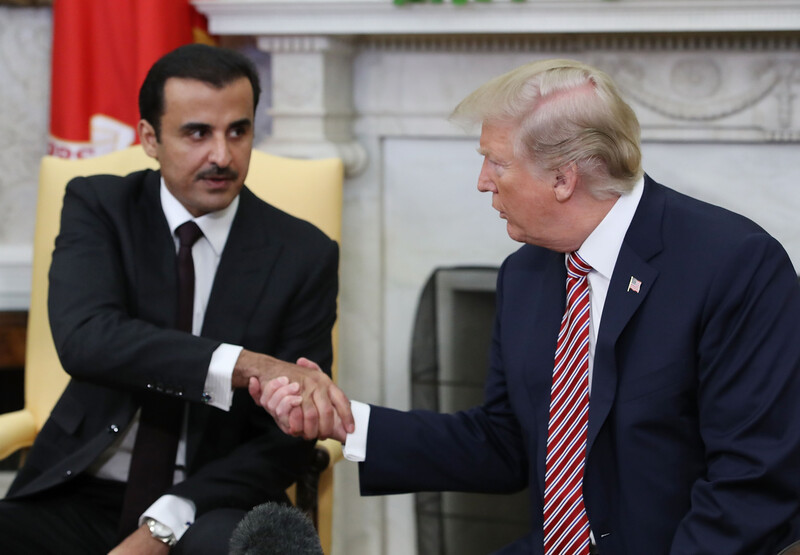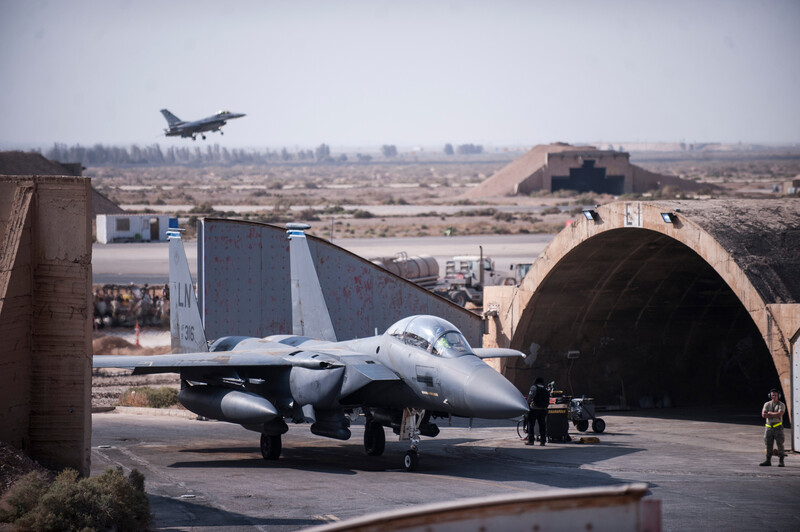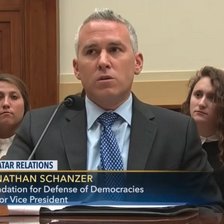The Electronic Intifada 4 June 2018

US President Donald Trump shakes hands with the Emir of Qatar Sheikh Tamim bin Hamad Al Thani, during a meeting in the Oval Office at the White House, on 10 April 2018.
Consolidated News PhotosAl Jazeera’s investigative documentary into the US Israel lobby was censored by Qatar over “national security” fears, The Electronic Intifada has learned.
These include that broadcast of the film could add to pressure for the US to pull its massive Al Udeid air base out of the Gulf state, or make a Saudi military invasion more likely.
A source has confirmed that broadcast of The Lobby – USA was indefinitely delayed as “a matter of national security” for Qatar. The source has been briefed by a high-level individual in Doha.
One of the Israel lobby groups whose activities are revealed in the film has been mounting a campaign to convince the US to withdraw its military forces from Qatar – which leaders in the emirate would see as a major blow to their security.
The tiny gas-rich monarchy houses and funds satellite channel Al Jazeera.
In April, managers at the channel were forced to deny a claim by a right-wing American Zionist group that the program has been canceled altogether.
In October 2017, the head of Al Jazeera’s investigative unit promised that the film would be aired “very soon.”
Yet eight months later, it has yet to see the light of day.
In March, The Electronic Intifada exclusively published the first concrete details of what is in the film.
The film reportedly identifies a number of lobby groups as working directly with Israel to spy on American citizens using sophisticated data gathering techniques. The documentary is also said to cast light on covert efforts to smear and intimidate Americans seen as too critical of Israel.
Some of the activity revealed in the film could include US organizations acting as front operations for Israel without registering as agents of a foreign state as required by US law.
The latest revelation over the censored film shows how seriously Qatar’s leadership is taking threats of repercussions should it air.
Threats
The Israel lobby groups reported on in the film could be expected to take legal action against Al Jazeera if it is broadcast.
However, such threats alone would be unlikely to deter Al Jazeera from broadcasting the film.
The network has a history of vigorously defending its work and it was completely vindicated over complaints about a documentary aired in January 2017 that revealed how Israel lobby groups in Britain collude with the Israeli embassy, and how the embassy interfered in British politics.
Israel’s supporters are also pushing for the US Congress to force the network, which has a large US operation, to register as a “foreign agent” in a similar fashion to Russian channel RT.
But the high-level individual in Doha’s claim that the film is being censored as “a matter of national security” ties the affair to even more serious threats to Qatar and bolsters the conclusion that the censorship is being ordered at the highest level of the state.
A year ago, with the support of US President Donald Trump and his son-in-law Jared Kushner, Saudi Arabia and the United Arab Emirates cut off diplomatic relations with Qatar and imposed a transport and economic blockade on the country.
Saudi rulers and their allies see Qatar as too independent of their influence and too open to relations with their regional rival Iran, and the blockade was an attempt to force it to heel.
The Saudis and Israel accused Qatar of funding “terrorism,” and have taken measures to restrict Al Jazeera or demanded it be shut down altogether over what they perceive as the channel’s anti-Israel and anti-Saudi-monarchy biases.
The blockade and the diplomatic assault sparked existential fears in Qatar that Saudi-led forces could go as far as to invade and install a more pliant regime in Doha.
French newspaper Le Monde reported on Friday that the Saudi king has threatened “military action” against Qatar should it go ahead with a planned purchase of a Russian air defense missile system.
In 2011, Saudi and Emirati forces intervened in Bahrain, another small Gulf nation, at the request of its ruling Khalifa monarchy in order to quell a popular uprising demanding democratic reforms.
For three years, US and British-backed Saudi and Emirati forces have been waging a bloody and devastating war on Yemen to reimpose a Saudi-backed leadership on the country, clear evidence of their unprecedented readiness to directly use military force to impose their will.
And no one in the region will have forgotten how quickly Iraqi forces were able to sweep in and take over Kuwait in August 1990.
Air base
The lesson of the Kuwait invasion for other small Gulf countries is that only the protection of the United States could guarantee their security from bigger neighbors.
Qatar implemented that lesson by hosting the largest US military facility in the region, the massive Al Udeid air base.
The Saudi-led bloc has pushed for the US to withdraw from the base and the Saudi foreign minister predicted that should the Americans pull out of Al Udeid, the regime in Doha would fall “in less than a week.”

US warplanes operate from the Al Udeid air base near Doha, Qatar, October 2017.
US Air Force PhotoIt would be a disaster from the perspective of Doha if the Israel lobby was to put its full weight behind a campaign to pull US forces out of Qatar.
Earlier this year, an influential member of Congress and a former US defense secretary publicly discussed moving the US base out of Qatar at a conference hosted by the Foundation for Defense of Democracies (FDD).
FDD is a neoconservative Israel lobby group that happens to be one of the subjects of the undercover Al Jazeera film.
As The Electronic Intifada revealed in March, FDD is one of the groups acting as an agent of the Israeli government even though it is not registered to do so.
In July 2017, FDD’s Jonathan Schanzer testified to Congress that it would be an “insane arrangement” to keep US forces at the Al Udeid air base while Qatar continued to support “terror.”
It will concentrate minds in Doha that FDD was one of the lobby groups most dedicated to destroying the international deal with Iran over its nuclear energy program, a goal effectively achieved when the Trump administration pulled out of it last month.
In a sign of how vulnerable Qatar feels over the issue, Doha has announced plans to upgrade the Al Udeid base in the hope, as the US military newspaper Stars and Stripes put it, “that the strategic military hub will be counted as one of the Pentagon’s permanent overseas installations.”
The final straw?
The cornerstone of Qatar’s effort to win back favor in Washington has been to aggressively compete with its Gulf rivals for the affections of Israel and its Washington lobby.
Their belief appears to be that this lobby is so influential that winning its support can result in favorable changes to US policy.
Qatar’s charm offensive has included junkets to Doha for such high-profile Israel supporters as Harvard law professor Alan Dershowitz and Morton Klein, the head of the Zionist Organization of America who publicly took credit for convincing Qatar’s ruler Emir Tamim bin Hamad Al Thani to veto broadcast of the documentary.
While an all-out Saudi invasion of Qatar over a film series may seem far fetched, the thinking in Doha seems to be that broadcast of The Lobby – USA could be the final straw that antagonizes Qatar’s enemies and exposes it to further danger – especially over Al Udeid.
With an administration in Washington that is seen as impulsive and unpredictable – it has just launched a trade war against its biggest partners Canada and the European Union – leaders in Doha may see it as foolhardy to take any chances.
If that is the reason Al Jazeera’s film has been suppressed it is not so much a measure of any real and imminent threat Qatar faces, but rather of how successfully the lobby has convinced Arab rulers, including in Doha, that their well-being and longevity rests on cooperating with, or at least not crossing, Israel and its backers.
Asa Winstanley is associate editor and Ali Abunimah is executive director of The Electronic Intifada.





